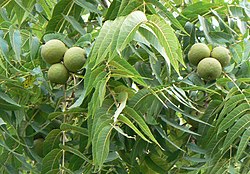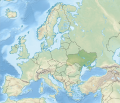The fall webworm (Hyphantria cunea) is a moth in the family Erebidae known principally for its larval stage, which creates the characteristic webbed nests...
24 KB (2,752 words) - 05:43, 20 May 2025
take-off. Gregarious caterpillars, such as the forest tent caterpillar and fall webworm, benefit from basking in large groups for thermoregulation. Many flying...
11 KB (1,327 words) - 16:05, 5 March 2025
sometimes confused with the spongy moth (whose larvae look similar) and the fall webworm (which also builds tents), and may be erroneously referred to as a bagworm...
12 KB (1,516 words) - 20:23, 25 May 2024
larvae—which include the common emerald, lime hawk-moth, sycamore moth, and fall webworm—also eat the plant. The Ancient Greeks and Romans cultivated the mulberry...
35 KB (3,676 words) - 07:01, 9 June 2025
caterpillars make their tents in the nodes and branches of a tree's limbs, fall webworms enclose leaves and small branches at the ends of the limbs. The following...
10 KB (1,286 words) - 18:39, 30 October 2024
late summer but generally does no lasting harm to a healthy tree), the fall webworm (also a late-season defoliator), the white flannel moth, the American...
14 KB (1,448 words) - 02:48, 9 April 2025
few species in this subfamily are of economic importance. Even the fall webworm, an abundant and highly polyphagous tree-feeding species that has spread...
22 KB (2,040 words) - 14:43, 16 May 2025
dead insects. They are predators of codling moth larvae, and also of fall webworm. Workers may forage in households, but nest in soil mounds. They harvest...
4 KB (392 words) - 17:16, 23 April 2025
they include in their diet adelgids, mites, insect eggs (an example is fall webworm eggs) and small larvae. They also eat pollen which may constitute up...
9 KB (1,111 words) - 01:42, 30 January 2025
Psychidae. Wikispecies has information related to Psychidae. Bagworm, Fall Webworm or Eastern Tent Caterpillar? Archived 2014-08-20 at the Wayback Machine...
17 KB (1,405 words) - 17:40, 23 May 2025
cagnagella and the ugly nest caterpillar, Archips cerasivoranus. The fall webworm Hyphantria cunea, is a patch restricted forager during the initial stages...
13 KB (1,833 words) - 18:57, 9 December 2023
October 15, 2024. Fitzgerald, T. D. (March 1, 2008). "Larvae of the fall webworm, Hyphantria cunea, inhibit cyanogenesis in Prunus serotina". Journal...
20 KB (2,088 words) - 12:16, 24 May 2025
generation of fall webworm larvae emerge between 350 and 749 GDD, the second between 791 and 1540 GDD, and the third between 1580 and 1790 Mimosa webworm larvae's...
15 KB (1,653 words) - 15:18, 7 June 2025
Workers use this ability to scavenge for dead insects such as earwigs and fall webworm larvae, as well as live arthropods. They are also frugivores, obtaining...
27 KB (3,312 words) - 16:45, 29 April 2025
and infect the larva. An example of an insect that it infects is the fall webworm. Baculoviruses are thought to have evolved from the Nudiviridae family...
25 KB (2,862 words) - 07:35, 25 May 2025
trees eventually die. The walnut caterpillar (Datana integerrima) and fall webworm (Hyphantria cunea) are two of the most serious pests, they commonly eat...
43 KB (4,983 words) - 10:14, 27 May 2025
generally avoided by Vespula species). They also prey on larvae of the fall webworm, as well as young hummingbirds. In general, they are not attracted to...
10 KB (1,247 words) - 02:56, 10 July 2024
bollworms, boll weevils, spotted cucumber beetles, sorghum midges, fall webworms, cotton leaf worms, cotton fleahopper, tarnished plant bugs, stink bugs...
32 KB (3,351 words) - 20:57, 10 June 2025
(western flower thrips) Hypera postica (alfalfa weevil) Hyphantria cunea (fall webworm) Icerya purchasi (cottony cushion scale) Linepithema humile (Argentine...
346 KB (26,125 words) - 06:02, 15 June 2025
Eulophidae. Chouioia cunea is considered an important parasite of the fall webworm in China, where the moth is an invasive species. Edosa, Tariku T.; Jo...
2 KB (128 words) - 21:35, 10 April 2024
patterns have also been observed during outbreaks of tent caterpillars, fall webworms, and cicadas. When they are a couple of days old, the chicks can make...
19 KB (2,005 words) - 11:51, 27 May 2025
beetle) [82] Hypera postica (alfalfa weevil) [83] Hyphantria cunea (fall webworm) [84] Icerya purchasi (cottony cushion scale) [85] Latrodectus geometricus...
18 KB (1,022 words) - 03:34, 27 September 2023
insects such as the forest tent caterpillar (Malacosoma disstria), the fall webworm (Hyphantria cunea), and the spruce budworm (Choristoneura fumiferana)...
6 KB (543 words) - 05:31, 21 January 2025
pine bark beetle) Hypera postica (alfalfa weevil) Hyphantria cunea (fall webworm) Icerya purchasi (cottony cushion scale) Linepithema humile (Argentine...
34 KB (2,078 words) - 00:58, 26 May 2025
(Gray Hairstreak), Zerene cesonia (Southern Dogface), Hyphantria cunea (Fall Webworm Moth), and Petrophila jaliscalis, the "Jalisco Petrophila." The larvae...
71 KB (9,876 words) - 06:49, 3 June 2025
Entomology. 33: 1–135. Tothill, John D. (1922). The natural control of the fall webworm (Hyphantria cunea Drury) in Canada : together with an account of its...
2 KB (180 words) - 03:16, 3 September 2024
O.; W. B. Peck; M. Tadic (July 1967). "Spiders Associated with the Fall Webworm, Hyphantria cunea (Lepidoptera: Arctiidae)". Journal of the Kansas Entomological...
20 KB (1,897 words) - 00:33, 15 June 2025
Ichneumonidae. It is a parasite of the webworm caterpillar in North America. T. morio adults lay their eggs inside webworm caterpillars by piercing them with...
4 KB (350 words) - 14:02, 7 August 2024
been found to have multiple hosts. These include Hyphantria cunea (the fall webworm), Malacosoma americana (Eastern tent caterpillar), Malacosoma disstria...
4 KB (346 words) - 02:16, 27 May 2025
widely considered as invasive. Box tree moth Colorado potato beetle Fall webworm Asian ladybeetle Horse-chestnut leaf miner Russian pig-flies Megachile...
5 KB (331 words) - 09:12, 27 May 2025
























